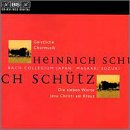| All Artists: Yoshikazu Mera, Chiyuki Urano, Yoshitaka Ogasawara, Heinrich Schutz, Masaaki Suzuki, Aki Yanagisawa, Midori Suzuki, Makoto Sakurada, Bach Collegium Japan Title: Schutz: Geistliche Chormusik, SWV 369-397 (Op 11) /Bach Collegium Japan * Suzuki Members Wishing: 0 Total Copies: 0 Label: Bis Original Release Date: 1/1/2006 Re-Release Date: 2/18/1997 Album Type: Import Genre: Classical Styles: Opera & Classical Vocal, Historical Periods, Baroque (c.1600-1750), Sacred & Religious Number of Discs: 2 SwapaCD Credits: 2 UPC: 789368653522 |
Search - Yoshikazu Mera, Chiyuki Urano, Yoshitaka Ogasawara :: Schutz: Geistliche Chormusik, SWV 369-397 (Op 11) /Bach Collegium Japan * Suzuki
 | Yoshikazu Mera, Chiyuki Urano, Yoshitaka Ogasawara Schutz: Geistliche Chormusik, SWV 369-397 (Op 11) /Bach Collegium Japan * Suzuki Genre: Classical
|
Larger Image |
CD Details |
CD ReviewsHeavenly Choir-Music Giordano Bruno | Wherever I am, I am. | 03/17/2008 (5 out of 5 stars) "By 1648, Heinrich Schuetz was both a survivor and a relic of his own past glory. The 63-year-old devout Lutheran had survived the religious slaughter of the Thirty Years War, which had killed more than half of the musicians of his German world. Surely the most influential composer of German history, he had also outlasted his own impact on the next generation of German composers, patrons, and audiences, who unjustly regarded his music as outdated. Who knows how he felt about his growing isolation, but it's interesting that he chose to compose one of his grandest and greatest accomplishments - the Geistliche Chormusik 1648, op. 11 - in the antiquated contrapuntal style of Renaissance vocal polyphony, the prima prattica, rather than the operatic Italianate seconda prattica he himself had introduced to German music. (The most obvious difference a modern listener might hear will be the absence of basso continuo, that is, of a chordal structure based on a bass.) In a sense, Schuetz was relinquishing the primacy of words over music, setting the familiar psalm texts to complexly intellectual counterpoint and letting the music convey the meaning. Schuetz's situation as the revered but no longer heard Master of the Chapel in Dresden oddly prefigures that of JS Bach, whose magnificently intellectual music was neglected by his own sons and pupils. The motets of the "Spiritual Choir Music" are essentially a capella, though trombones and bassoons might serve in a few. Despite his re-commitment to prima prattica, Schuetz managed to blend his superb sense of musical drama into his dense counterpoint, relying on much shorter phrases and much more operatic sectional contrasts than the polyphony of the great Flemish masters of the 16th Century. This music requires a conductor with a strong sense of theater. Such a conductor is Masaaki Suzuki, best known for his vigorous direction of the JS Bach cantatas. Susuki is not hesitant about using the full dynamic range of his choir, or about setting tempi from adagio to presto. Even the great Philippe Herreweghe seems timid by comparison, on his Harmonia Mundi CD of the Geistliche Chormusik. It seems obvious that Schuetz never foresaw the birth of recording and never supposed that all the motets of his Opus 11 would be sung as a unitary composition. Alas, timid conducting and unresponsive choirs can make these motets sound "all the same." Suzuki uniquely overcomes this uniformity, establishing the special emotional tenor of each motet from the first bar on. The Bach Collegium Japan is a splendid instrument for a conductor like Suzuki - pitch perfect and disciplined to respond to his baton. Their sound is full and warm, with a choral resonance that suits these motets like a musical glove. There are at least four other CDs available of the Geistliche Chormusik, but this one is easily the best of the bunch. The motet Selig sind die Toten - Blessed are the Dead - has a powerful personal resonance for me. I've had the sad privilege of singing it at memorial services for several close musical friends who've died of AIDS. The Bach Collegium Japan's performance of it brings me blessedly to tears. " The best 'Geistliche Chormusik' ever heard Jan Strasser | Switzerland | 10/31/1999 (5 out of 5 stars) "Masaaka Suzuki and his Bach Collegium Japan convey the spirit of this music better than many german artists. Subtle, vivid, unpretentious and technically perfect." Beautiful Harmony Jan Strasser | 07/15/2003 (5 out of 5 stars) "I realized the excellence of Schutz by Geistliche Chormusik. It condenses the sacred essence. The chorus has purity, tranquillity and harmony. Its harmony makes up the magnificent world of polyphony. There is also the beauty of German language. This is splendid music."
|

 Track Listings (20) - Disc #1
Track Listings (20) - Disc #1